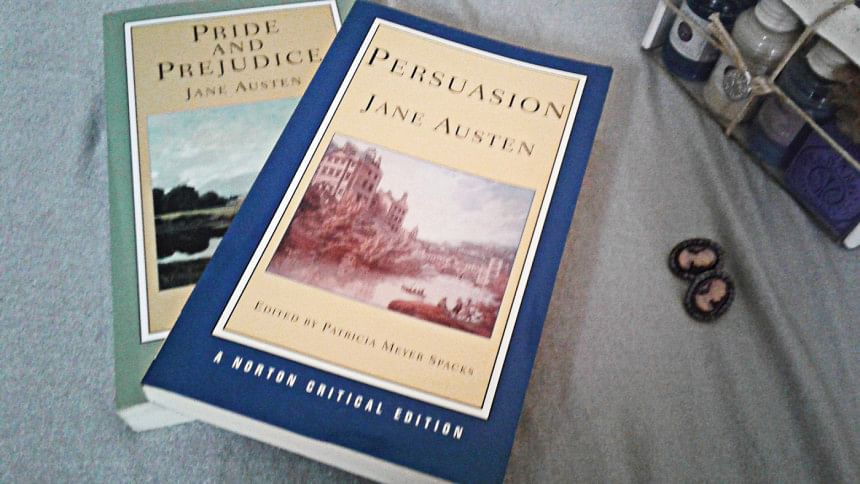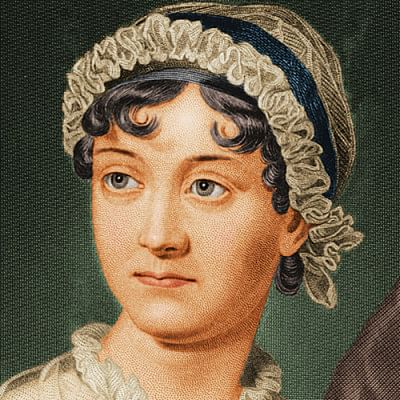Sparkling Elizabeth and Timid Anne: Two Sides of the Same Coin?

Readers over the last two centuries have generally liked the bright and sparkling world of Jane Austen's Pride and Prejudice, whereas Persuasion has often been described as "a departure from the rest of the novels, a turning away from the brilliant and public play of the mind for the deep and private truths of the heart" (Morgan 168). Yet there are certain aspects in these two novels that have made at least some critics and readers question if Persuasion might be a revisiting of Austen's earlier novel. The reawakening of feelings and emotions of Anne Elliot and Fredrick Wentworth is a revisiting of what they had before they broke up. Anne's visit to Kellynch, Wentworth's return to Somersetshire and the subsequent events suggest not simply repetition, but fresh understanding and recognition of what they had together. Hence, isn't it possible that a novel that concentrates so much on the theme of revisiting, is a revisiting of a prior work, namely, Pride and Prejudice?
When looking at the two novels, it is next to impossible to ignore the similarity between the novelist's handling of the rejected suitors. The heroines of both novels decide to refuse the first proposals from the men they ultimately marry, and both come to regret their earlier decisions and learn to improve themselves. The heroes, too, learn to reassess their personalities, social positions, and more important, the depth and extent of their emotions and feelings for the women they love. In short, both couples improve through loss, misunderstanding, and separation.But why did Austen deign to look back and explore themes and scenes of such a successful novel as Pride and Prejudice? In a letter to her sister Cassandra on February 4, 1813, Jane Austen wrote that Pride and Prejudice was "rather too light & bright & sparkling;-- it wanted shade; -- it wants to be stretched out here & there with a long Chapter" (Letters 203). Indeed, one theme dark and somber in this sparkling novel is the marriage of Charlotte Lucas and Mr. Collins. In Pride and Prejudice, the idea that a woman of twenty-seven cannot introduce romantic love is forcefully implemented through the decision made by Charlotte Lucas. At the age of seven-and-twenty, Charlotte encourages and accepts the proposal of the pompous Mr. Collins because she has little money and beauty, and is unwilling to lead the life of a spinster. Her reasoning is practical, reflecting on crude expectations of a society that appreciates a woman only when she has entered marriage. In her last novel, however, Austen decides to re-introduce and re-assess how much chance a woman of twenty-seven has in inspiring love and in the marriage-mart. Anne Elliot, the heroine of Persuasion, is about the same age when she is reacquainted with her old love.
At first glance, however, Elizabeth Bennet and Anne Elliot seem to have few similarities. Elizabeth is all that Anne is not—sparkling and lively, witty, probably rather impudent, and observant, taking pride in understanding people's characters. And yet, most readers forget how Pride and Prejudice sets out. Even though Elizabeth's father praises her for being different from his other daughters, she hardly stands out among her sisters. Beside lovely Jane and boisterous Lydia she fades into background. Very soon, however, she starts moving about with ease and grace, has her own set of admirers even if snobbish aristocrats like Darcy look disdainfully at her.

Anne, on the other hand, seems even more quiet than Elizabeth in the beginning. After their first meeting Wentworth comments that she has altered so much that he almost did not recognize her. So, how did she look like? Austen describes her briefly as, "a few years before Anne Elliot had been a very pretty girl, but her bloom had vanished early" (5). She has had eight years to ponder over her decision of breaking her engagement, and Anne's moment of glowing happiness returns after she hears Wentworth's passionate commentary on Benwick's betrothal to Louisa Musgrove:
Anne saw nothing… Her happiness was from within. Her eyes were bright, and her cheeks glowed,-- . . . . His opinion of Louisa Musgrove's inferiority, an opinion which he had seemed solicitous to give, —his half averted eyes, and more than half expressive glance,-- all, all declared that he had a heart returning to her at least. . . . He must love her. (Persuasion 123)
She has been waiting for Wentworth to return and reclaim her, but up until this moment all that the readers have had are half-expressed passages from Anne.
Elizabeth Bennet faces similar moments of epiphany after meeting Darcy at Pemberley again and more so after Lydia's elopement:
She began now to comprehend that he was exactly the man, who in dispositions and talents, would most suit her. His understanding and temper, though unlike her own, would have answered all her wishes. (Pride and Prejudice 202)
After hearing from the housekeeper and seeing Darcy's portrait Elizabeth realizes that he would have made her the husband she could ever want. Darcy's changed behavior and kindness confirm her belief. But Lydia's disgraceful elopement makes her realize that he would surely never stoop so low as to marry a sister-in-law of Wickham.
Both Elizabeth and Anne had good reasons behind their refusals, but both also regret their decisions later. Elizabeth refuses Darcy for two reasons—that he mistreated Wickham, and he had been the cause behind Jane's unhappiness. Even though her first conjecture is grounded on false information, her second accusation against Darcy is true. Yet, later on she realizes that sometimes well-intentioned people too, can make mistakes, as Darcy did by wanting to save his friend from making a loveless marriage with low connections. Furthermore, Jane's unhappiness in love is caused more by the members of her own family and Jane's own reticence in expressing her feelings than by Darcy's intervention.
Unlike Elizabeth, however, Anne's refusal sprang from prudence. Persuaded by her surrogate mother-figure Lady Russel, she thought that it would not be a good idea for het to get into a long engagement with Wentworth. She broke up with him even though she loved him. And yet she says: "I should have suffered more in continuing the engagement than I did in giving it up, because I should have suffered in my conscience" (Persuasion 164). I believe that Anne's observation is Austen's own dictum against long-term engagements. Through the engagements of Edward Ferrars and Lucie Steele, Frank Churchill and Jane Fairfax, Austen's attitude toward long-term engagement becomes clear. Whereas Edward is trapped into a relationship he does not want any more, Jane has to watch her betrothed flirt with another young lady. Ironically for Anne, she suffers in a similar vein not because she was imprudent in her youth, but because she was prudent. Much like Jane, she too, helplessly observes Wentworth flirting with other young women, and her situation is more painful because she believes that she has lost him forever. It almost seems that in some subtle ways Austen is gently mocking the traditional good sense and propriety.
Perhaps, the significant similarity between Elizabeth and Anne is that they reverse the tradition of male authority. Both of them step out to rectify their past mistakes and take initiative in regaining what they lost. After Mr. Bingley brings Mr. Darcy back to visit Longbourn, during their walk Elizabeth at the very first opportunity thanks him for what he has done for Lydia, and thus opens the conversation that naturally leads to his reasons for saving Lydia from total disgrace. Anne's situation is very similar, but since her mistake was greater than Elizabeth's her amends has to be greater too. So, we hear her whispering passionately to Captain Harville, "All the privilege I claim for my own sex (it is not a very enviable one, you need not covet it) is that of loving longest, when existence or when hope is gone" (Persuasion 157). If she had made an error in judgment, if she had hurt her lover once upon a time, through this comment she makes the best amends possible. Even if she is not talking to Wentworth, he is in the vicinity, and in revealing her heart she puts herself in a vulnerable position. William Galperin sees her "early loss of bloom" following her rejection of Wentworth as an act of autonomy and a lasting effect of her decision to remain single. The period ends with the famous walk at Lyme when her beauty is miraculously restored and she becomes the "cause of two men's admiration" (222).
Another notable similarity between these two Austenian heroines is that through their marriages they cross the barriers of class-difference. Even though in her defense to Lady Catherine de Bourgh Elizabeth claims to be a gentleman's daughter, in her union with Darcy she actually crosses over the seemingly uncrossable barrier. Elizabeth's father belongs merely to the gentry (and she is tainted by her mother's family who are in business), whereas Darcy is definitely from the untitled but aristocrat class. Strangely enough, Anne Elliot is the only other heroine of Austen who shifts from one class to another so ostentatiously. However, Austen once again revisits and reconstructs her former ideas because Anne belongs to the landed gentry, but by "accepting Frederick Wentworth the naval officer in preference to Charles Musgrove or William Walter Elliot, she (Anne) leaves the life of the stately homes, taking its best feminine strengths with her" (Magee 206). In all her previous novels, Austen often mocks the landed gentry when they fail to do their duty, but her heroes always belong to the class of land owners. In her last novel, however, like her heroines she herself seems to abandon the old dissipated land owners and aristocrats in favor of the rising professional class.
Sohana Manzoor teaches English at ULAB. She is also the Literary Editor of The Daily Star.

 For all latest news, follow The Daily Star's Google News channel.
For all latest news, follow The Daily Star's Google News channel. 



Comments